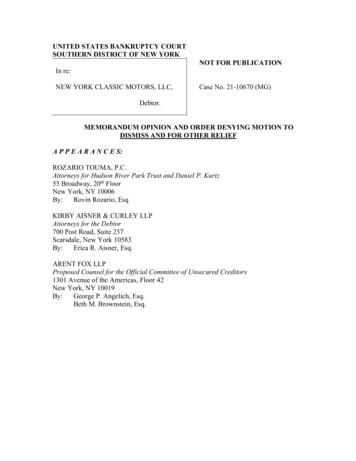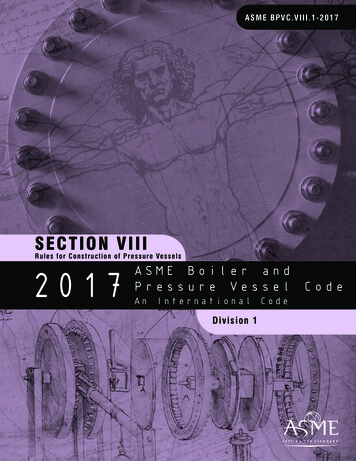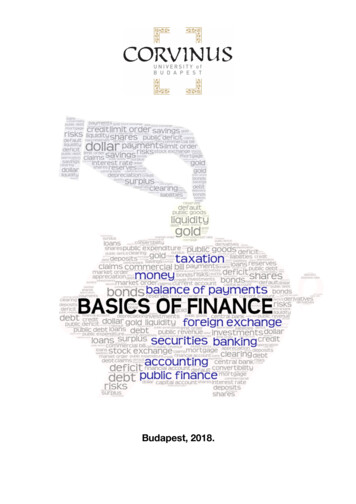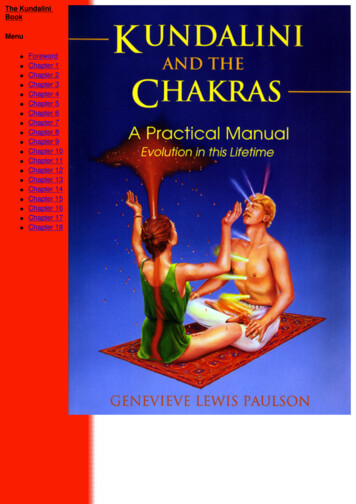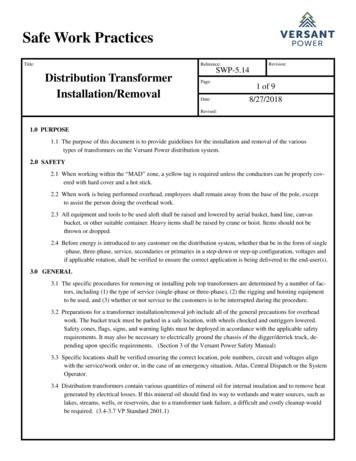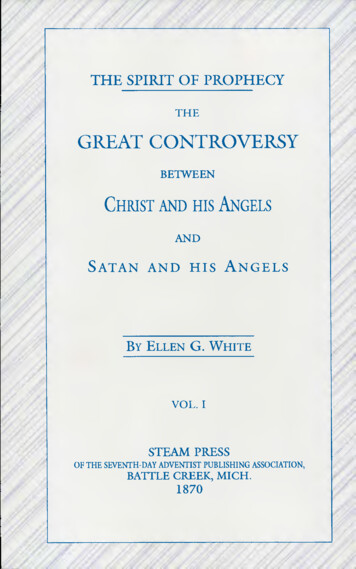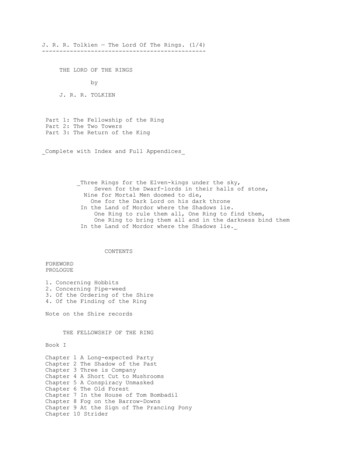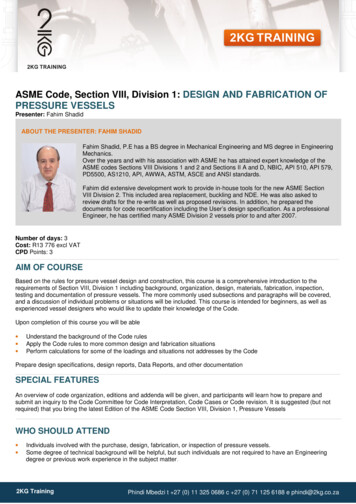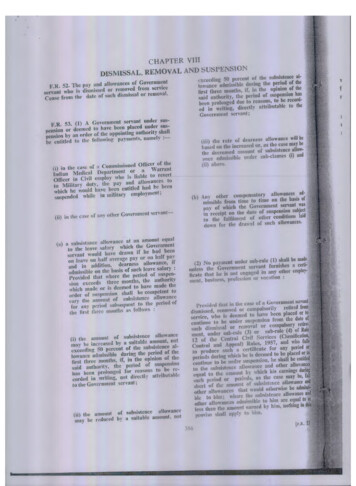
Transcription
CHAPTER VIII.DISMISSAL, REMOVAL AND SUSPENSIONF.R. 52. The pay and allowances of Governmentservant who is dismissed or removed from serviceCease from the date of such dismissal or removal.A Government servant under susF.R. 53. (1)pension or deemed to have been placed under suspension by an order of the appointing authority shallbe entitled to the following payments, namely :—in the case of a Commissioned Officer of the(i)ntIndian Medical Department or a WarraOfficer in Civil employ who is liable to revertto Military duty, the pay and allowances towhich he would have been entitled had he beensuspended while in military employment;(ii)in the case Of any other Government servant--(a) a snbsistance allowance at an amount equalto the leave salary which the Governmentservant would have drawn if he had beenon leave on half average pay or on half payand in addition, dearness allowance, ifadmissible on the basis of such leave salary :Provided that where the period of suspension exceeds three months, the authoritywhich made or is deemed to have made theorder of suspension shall be competent tovary the amount of subsistence allowancefor any period subsequent to the period ofthe first three months as follows :(i) the amount of subsistence allowancemay be increased by a suitable amount, notexceeding 50 percent of the subsistence allowance admissible during the period of thefirst three months, if, in the opinion of thesaid authority, the period of suspensionhas been prolonged for reasons to be recorded in writing, not directly attributableto the Government servant;(ii) the amount of subsistence allowancemay be reduced by a suitable amount, notexceeding 50 percent of the subsistence allowance admissible during the period of thefirst three months, if, in the opinion of thesaid authority, the period of suspension hasbeen prolonged due to reasons, to be recorded in writing, directly attributable to theGovernment servant;(iii) the rate of dearness allowance will bebased on the increased or, as the case may bethe decreased amount of subsistence allowance admissible under sub-clauses (i) and(ii) above.(b) Any other compensatory allowances admissible from time to time on the basis ofpay of which the Government servant wasin receipt on the date of suspension subjectto the fulfilment of other conditions laiddown for the drawal of such allowances.(2) No payment under sub-rule (1) shall be madeunless the Government servant furnishes a certificate that he is not engaged in any other employomit, business, profession or vocation :Provided that in the case of a Government servantdismissed, removed or compulsorily retired fromservice, who is deemed to have been placed or tocontinue to be under suspension from the date ofsuch dismissal or removal or compulsory retireof Rulement, under sub-rule (3) or sub-rule (4)12 of the Central Civil Services (Classification,Control and Appeal) Rules, 1957, and who failsto produce such a certificate for any period orperiods during which he is deemed to be placed or tocontinue to be under suspension, he shall be entitledto the subsistence allowance and other allowancesequal to the amount by which his earnings duringfasuch period or periods, as the case may be,lishort of the amount of subsistence allowance andother allowances that would otherwise be admissible to him; where the subsistence allowance andother allowances admissible to him are equal to orless than the amount earned by him, nothing in thisproviso shall apply to him.f
,DISMISSAL, RBMOVAL AND SUSPENSION388ORDERS/INSTRUCTIONS1. Review of subsistence allowance :—The suspended officer would continue to draw subsistenceallowance at the rate of his leave salary onhalf average pay until the competent authority passed an order under F.R. 53/(1)(ii)(a).in view of the fact that any failure on the partof the competent authority to pass an order assoon as the suspended officer has been undersuspension for six (now three) months can eitherinvolve serious hardship to the officer concernedor involve unnecessary expenditure to Government, Ministries are requested to issue instrucions to all authorities under them having powersto suspend Government servants under them witha view to ensure that action is initiated in all suchcases in sufficient time so that the requisite ordercan take effect as soon as the suspended officerhas completed six (now three) months under suspension.(G. I., M.F., O.M. No. F. 19(4)-E. IV/55. dated the17th June, 1958.)[P.R. 53of the subsistence allowance initially grantedif the period of suspension has been prolongedfor reasons directly attributable to the Government servant, i.e., by his adopting dilatory tactics.Similary, in a case where the amount of subsistence allowance has been reduced after the firstreview, the same can be increased upto fifty percent of the amount initially granted, if the periodof suspension has been prolonged for reasonsnot directly attributable to the Governmentservant and the Government servant has givenup dilatory tactics.(G. I., M.F., O.M. No. F. (1)-E.IV(A)/66, dated the30th June, 1966.)(1-C) It has been decided that a review of thesubsistence allowance would be made at theend of three months from the date of suspensioninstead of the present practice of varying the subsistence allowance after 6 months. This wouldalso give an opportunity to the concerned authority to review not merely the subsistence allowance but also the substantive question of suspension.(G. I., ME{A, Deptt. of Personnel & A.R. O.M. No16012/1(79-LU dated the 23rd August, 1979.)(1-A) It is obligatory under F.R. 53 that insufficient time before the expiry of the first six(now three) months of suspension, the competentauthority should review each case in which theperiod of suspension is likely to exceed six (nowthree) months, and even if it comes to the conclusion that the rate is not to be altered havingregard to all the circumstances of the case, specific orders to that effect are to be passed placingon record the circumstances under which thedecision had to be taken.(O. I., M.,F O. M. No. F. 15 (16)-E.IV/5S, dated the16th Febr uary , 1959.)(1-B) Though the proviso to F.R. 54 (l)(ii)(a)does not specifically provide for a second orsubsequent review, there is no objection to suchreview(s) being made by the competent authority.Such authority shall be competent to pass ordersto increase or decrease the rate of subsistenceallowance upto fifty per cent of the amount ofsubsistence allowance initially granted, according to the circumstances of each case. A secondor subsequent review can be made at any time atthe discretion of the competent authority.It is permissible to reduce the amount of subsistence allowance once increased on the basisof the first review upto fifty percent of the amount2. Subsistence allowance—Timely payment:—(i) In the case of Ghandhyam Das SrivastavaVs. State of Madhya Pradesh (AIR 1973 SC1183), the Supreme Court had observed thatwhere a Government servant under suspensionpleaded his inability to attend the enquiry onaccount of financial stringency caused by thenon-payment of subsistence allowance to him,the proceedings conducted against him expartewould be in violation of the provisions of Article311(2) of the Constitution as the person concerneddid not receive a reasonable opportunity of defending himself in the disciplinary proceedings.(ii) In the light of the judgement mentionedabove, it may be impressed on all authoritiesconcerned that they should make timely paymentof subsistence allowance to Government servants who are placed under suspension so thatthey may not be put to financial difficulties. Itmay be noted that, by its very no ture, subsistenceallowance is meant for the subsistence of a suspended Government servant and his family duringthe period he is not allowed to perform any dutyand thereby earn a salary. Keeping this in view,all concerned authorities should take promptsteps to ensure that after a Government servantis placed under suspension, he received subsistence allowance without delay.
390DISMISSAL, REMOVAL AND SUSPENSION(iii) The judgement of the Supreme Courtreferred to' in para 1 above indicates that in thatcase, the disciplinary .authority proceeded withthe enquiry exparte notwithstanding the factthat the Government servant concerned hadspecifically pleaded his inability to attend theenquiry on account of financial difficulties causedby non-payment of subsistence allowance. TheCourt had held that holding the enquiry exparte under such circumstances would be violative of Article 311(2) of the Constitution on account of denial of reasonable opportunity ofdefence. This point may also be kept in viewby all authorities concerned before involving theprovisions of Rule 14(20) of the CCS(CCA)Rules, 1965.[p.n. 53the revovery of Government dues from the subsistence allowance granted to a Governmentservant under suspension. The question of making ,such recoveries from the subsistence allowancehas accordingly been under consideration forsome time past. The .permissible deduction fallunder the two categories :—(a) Compulsory deductions.(b) Optional deductions.(2) It has been decided that the recovery ofthe following deductions which fall under category (a) above, should be enforced from the subsistence allowance :—(i Income-tax (provided the employee'syearly income calculated with referenceto subsistence allowance is taxable).(ii) House rent and allied charges, i.e., electricity, water, furniture, etc.(iii) Repayment of loans and advances takenfrom Government at such rates as thehead of the department deems it right togI1fr1trqf.1- 3Ti)(Department of Personnel & A.R. O.M. No. 1101210/76-Jests. (A) dated 6th October, 1976.)fix.(2-A)(i) The Stall' Side of the Committee ofthe National Council (SCM) set up to review CCS(CCA) Rules, 1965 has pointed out that inspiteof clear instructions, a large number of Government servants who are under suspension are notbeing paid the subsistence allowance regularly.(ii) As mentioned in the above O.M., SupremeCourt have held that if a government servant undersuspension pleads his. inability to attend the disciplinary proceedings on account of non paymentof subsistence allowance, the enquiry conductedagainst him, ex-parte, could be construed asdenial of reasonable opportunity of defendinghimself. It may, therefore, once again be impressedupon all authorities concerned that after a Government servant is placed under suspension,prompt steps should be taken to ensure that immediate action is taken under F.R. 53, for paymentof subsistence allowance and the Governmentservant concerned receives payment of subsistence allowance without delay and regularly subject to the fulfilment of the condition laid down inF.R. 53. In cases where recourse to ex-parteproceedings becomes necessary, it should bechecked up and confirmed that the governmentservant's inability to attend the enquiry is notbecause of non-payment of subsistence allowance.(Dc.ptt. of Personnel & A.R. O.M. No. 11012/17/85Ests. (A) dated 28th October, 1985.)3. Recoveries from subsistence allowance :-(1) At present there is' no provision in any rulesor orders issued by the Governmet of India for19(iv) Contribution under Central GovernmentHealth Scheme.Contributiontowards Central Govern(v)ment Employees Insurance Scheme, 1977.(vi) Subscription to the Central Governmen tEmployees' Group Insurance Scheme,1980.(3) The deductions falling under category (b),which should not be made except with the Government servant's written consent, are as under :(a) Premia due on Postal Life AssurancePolicies.(b) Amounts due to Co-operative Stores andCo-operative Credit Societies.(c) Refund of advances taken from GeneralProvident Fund.(4) It has further been decided that the deductions of the following nature should not be madefrom the subsistence allowance(i) Subscription to a General Provident.Fund.(ii) Amounts due on Court attachments.(iii) Recovery of loss to Government for whicha Government servant is resoponsible.(5) As regards the recovery of over-payments,the competent administrative authority will exercise discretion to decide whether the recoveryshould be held wholly in abeyance or it shouldbe effected at a rate not exceeding one-third ofthe subsistence allowance only, i.e., excludingdearness allowance and other compensatoryallowances.1(O. I., M.F., O.M. No. F. 15(5)-E. IV/57, dated ih u8th September, 1959 and 20th November, 1961.)cr.fa0Szr
392DISkISSAL, ,,ItElf (NAL AND SUSPENSIONF.R. 54. (1) When a Government servant whohas been dismissed, removed or compulsorilyretired is reinstated as a result of appeal or reviewor would have been so reinstated bat for his retirement on superannuation while under suspensionor not, the authority competent to order reinstatement shall consider and make a specific order—(a) regarding the pay and allowances to be paidto the Government servant for the periodof his absence from duty including the periodof suspension preceding his dismissal, removal, or compulsory retirement, as thecase may he; and(b) whether or not the said period shall be treatedas a period spent on duty.(2) Where the authority competent to orderreinstatement is of opinion that the Governmentservant who had been dismissed, removed or compulsorily retired has been fully exonerated, theGovernment servant shall, subject to the provisionsof sub-rule (6), be paid the full pay and allowancesto which he would have been entitled, had he notbeen dismissed, removed or compulsorily .retired orsuspended prior to such dismissal, removal or compulsory retirement, as the ease may beProvided that where such authority is of opinionthat the termination of the proceedings institutedagainst the Government servant lied been delayeddue to reasons directly attribatabic to the Government servant it may, after giving him an opportunity to make his representation within sixtydays from the date on which the communication inthis regard is served on him and after consideringthe representation, i any, submitted by him, direct,for reasons to be recorded in we:ting, that theGovernment servant shall, subject to the provisionsof sub-rule (7) be paid for the period of such delay,only such amotott (not being the whale) of such payand allowances as it may determine.(3) In a case falling under sub-rule (2), the periodof absence from duty including the period of sus-54pension, preceding dismissal, removal or compulsory retirement, as the ease may be, shall be treatedas a period spent on duty for all purpose's.(4) In cases other than those covered by subrule (2) (including cases where the order of dismissal, removal or compulsory retirement. fromservice is set aside by the appellate or reviewingauthority solely on the ground of non-compliancewith the requirements of clause (1) or clause (2) of Article 311 of the Constitution and no furtherinquiry is proposed to be held the Government servant shall, subject to the povisions of sub-rules(6) and (7), be paid such amount (not being the whole)of the pay and allowances to which he would havebeen entitled, had he not been dismissed, removedor compulsorily retired or suspended prior to suchdismissal, removal or compulsory retirement, asthe case may be, as the competent authority maydetermine, after giving notice to the Governmentservant of the quantum proposed and after considering the representation, if any, submitted by himin that connection within such period (which inno ease shall exceed sixty dretis from the date onwhich the notice has been served) as may bspecified, in the notice.(5) In a case falling under sub-rule (4), the periodof absence from duty including the period of suspension preceding his dismissal, removal or compulsory retirement, as the case may be, shall notbe treated as a period spent on duty, unless thecompetent authority specifically directs that itshall be treated so for any specified purpose :Provided that if the Government servant so desires such authority may direct that the period orabsence from duty including the period of suspension preceding his dismissal, removal or conepulsory retirement, as the case may be, shall bconverted into leave of any kind due and admissible to the Government servant,
394DISMISSAL, REMOVAL AND S uSEENS4.NNOTE :—The order of the competent authorityunder the preceding proviso shall be absoluteand no higher sanction shall be necessary for thegrant of—(a) extraordinary leave in excess of three monthsin the case of temporary G9vernimn tservant; and(b) leave of any kind in excess of five years inthe case of permanent or quasi-permanentGovernment servant.(6) The payment of allowances under sub-rule(2) or sub-rule (4) shall be subject to all other conditions under which such allowances are admissible.(7) The amount determined under the proviso tosub-rule (2) or under sub-rule (4) shall not be lessthan the subsistence allowance and other allowances admissible under Rule 53.(8) Any payment made under this rule to aGovernment servant on his reinstatement shall besubject to adjustment of the amount, if any, earnedby him through an employment during the periodbetween the date of removal, dismissal or compulsoryretirement, as the case may be, and the date ofreinstatement. Where the emoluments admissibleunder this rule are equal to or less than the amountsearned during the employment elsewhere, nothingshall be paid to the Government servant.F.R. 54-A. (1) Where the dismissal, removal orcompulsory retirement of a Governmentservant is set aside by a court of law and suchGovernment servant is reinstntml without holdingany further inquiry, the period of absence fromduty shall be regularised and the Government servant shall be paid pay and allowances in accordancewith the provisions of sub-rule (2) or (3) subjectto the directions, if any of the C. r urt.(2)(i) Where the dismissal, removal or compulsory retirement of a Government servantis set aside by the court solely on the groundof non-compliance with the requirementsof clause (1) or clause (2) of Article 311of the Constitution and where he is notexonerated on merits, the Government servant shall, subject to the provisions ofsub-rule (7) of Rule 54, be paid such amount[.R. 54-A(not being the whole) of the pay and allowances to which he would have been entitledhad he not been dismissed, removed orcompulsorily retired, or suspended priorto such dismissal, removal or compulsory .retimn,ashcyetompetent authority may determine, after givingnotice to the Government servant of thequantum proposed and after considering therepresentation, if any, submitted by him,in that connection with in such period (whichha no case shall exceed sixty days from thedate on which the notice has been served)as may be specified in the notice.(ii) The period intervening between the date ofdismissal, removal or compulsory retirementincluding the period of suspension precedingsuch dismissal, removal or compulsory retirement, as the case may be, and the dateof judgement of the court shall be regularised in accordance with the provisionscontained in sub-rule (5) of Rule 54.(3) If the dismissal, removal or compulsory retirement of a Government servant is set aside bythe court on the merits of the case, the period intervening between the date of dismissal, removalor compulsory retirement including the period ofsuspension preceding such dismissal, removal orcompulsory retirement, as the case may be, and thedate of reinstatement shall be treated as (laity forall purposes and the shall be paid the full pay andallowances for the period, to which he would havebeen entitled, had he not been dismissed, removedor compulsorily retired or suspended prior to suchdismissal, removal or compulsory retirement asthe case may be.(4) The payment of allowances under sub-rule(2) or sub-rule (3) shall be subject to all othuconditions under which such allowances are admisible.(5) Any payment made under this rule toGovernment servant on his reinstatement shall Issubject to adjustment of the amount, if any, canesby him through an employment during the periabetween the date of dismissal, removal or compulsoi
396DLSAISSAL. REMO VAL AND SUSPENSIONretirement and the date of reinstantement. Wherethe emoluments admissible under this rule areequal to or less time those earned during the employment elsewhere, nothing shall be paid to theGovernment servant.F.R. 54-B. (I) Wnen a Government servantwho has been suspended is reinstated or wouldhave been so reinstated but for his retire:neat (including premature retirement) while under suspension, the authority competent to order reinstatement shall cansider and make a specific order—(a) regarding the pay and allowances to be paidto the Government servant for the period ofsuspension ending with reinstatement or thedate of his retirement (including prematureretirement), as the case may be; and(b) whether or not the said period shall be treated as a period spent on duty.(2) Notwithstanding anything contained in Rule53, where a Government servant under suspensiondies before the disciplinary or the court proceedings instituted against him are concluded, the periodbetween the date of suspension and the date ofdeath shall be treated as duty for all purposes andhis family shall be paid the full pay and allowancesfor that period to which he would have been entitledhad he not been suspended, subject to adjustment inrespect of subsistence allowance already paid.(3) Where the authority competent to orderreinstatement is of the opinion that the suspensionwas wholly unjustified, the Government servantshall, subject to the provisions of sub-rule (8) bepaid the full pay and allowances to which he wouldhave been entitled, had he not been suspended :Provided that where such authority is of theopinion that the termination of the proceedingsinstituted against the Government servant had beendelayed due to reasons directly attributable tothe Government servant, it may, after givinghim an opportunity to make his representationwithin sixty days from the date on which the .communication in this regard is served on himand after considering the representation, if any,submitted by him, direct, for reasons to be recordedin writing, that the Government servant shallbe paid for the period of such delay only suchamount (not being the whole) of such pay and.11owances as it may determine.{F.R. 54-B(4) In a case falling under sub-rule (3) the periodof suspension shall be treated as a period spenton duty for all purposes.(5) In case other than those falling under subrules (2) and (3) the Government servant shallsubject to the provisions of sub-rules (8) and (9)be paid such amount not being the whole of thepay and allowances to which lie whould have beenentitled had he not been suspended, as the competentgiving noticeauthority may determine, afterto the Government servant of the quantum proposedand after considering the representation, if anysubmitted by him in that coninnectionsuch period (which in no case shall exceed sixtydays from the date on which the notice has beenserved) as may be specified in the notice.(6) Where suspension is revoked pending firmlisation of the disciplinary or the court proceedings,1any order passed under sub-rule (1) before theconclusion of the proceedings against the Government servant, shall be reviewed on its own motionafter the conclusion of the proceedings by theauthority mentioned in sub-rule (1) who shall makean order according to the provisions of sub-rule(3) or sub-rule (5) as the case may be.(7) In a case falling under sub-rule (5), theperiod of suspension shall not be treated as a periodspent on duty unless the competent authorityspecifically directs that it shall be so treated forany specified purpose:Provided that if the Government servant sodesires such authority may order that the periodof suspension shall be converted into leave eany kind due and admissible to the Governmentservant.order of the competent atitheritNOTE.—Theunder the preceding proviso shall bo absoluteand no higher sanction shall be necessary forthe grant of :-leave in excess of tlirc(a) extraordinarymonths in the case of temporary Government servant; and(b) leave of any kind in excess of five yearin the case of permanent or quasi-peemanent Government servant,(8) The payment of allowances under subrule (2), sub-rule (3) or sub-rule (5) shall be subjeeto all other conditions under which such allowancearc admissible.(9) The amount determined undero sub-rule (3) or under sub-rule (5) shall notless than the subsistence allowance and otiallowances admissible under Rule 53.
pended officer would continue to draw subsistence allowance at the rate of his leave salary on half average pay until the competent autho- rity passed an order under F.R. 53/(1)(ii)(a). in view of the fact that any failure on the part of the competent authority to pass an order as soon


